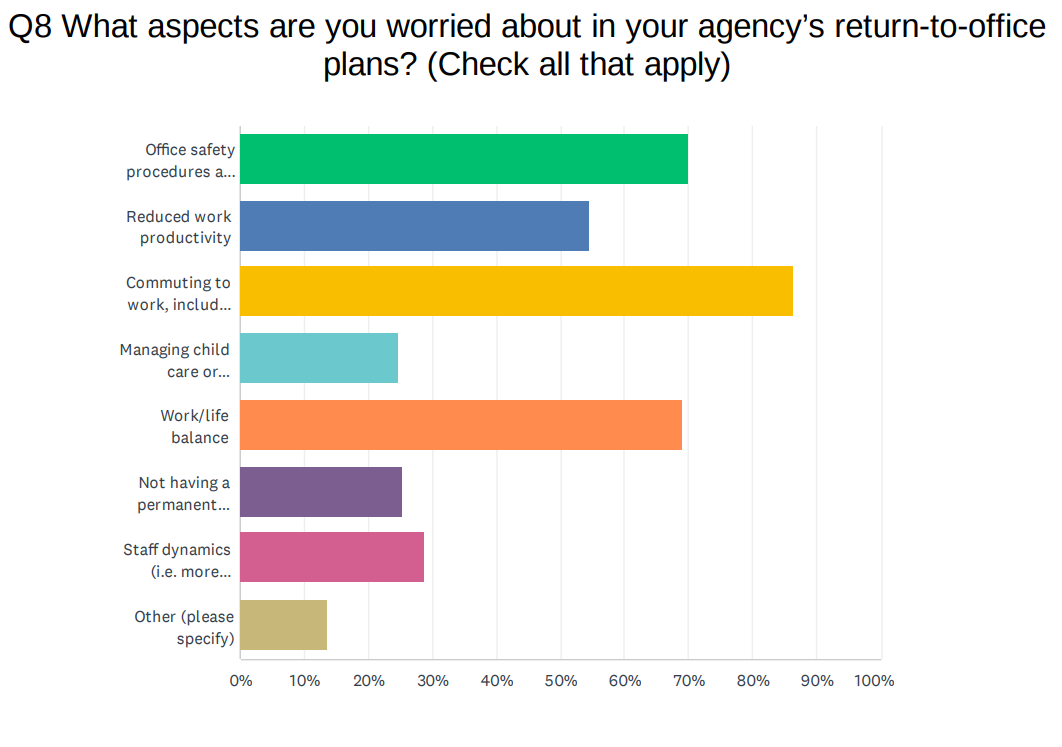Survey: Worried about back-to-office plans? A lot of you are.
Federal News Network asked what federal employees thought about returning to the office – they shattered our survey record.
We asked, and you answered — 3,279 of you to be exact. Our questions on returning to the office yielded by far the most responses we’ve ever seen for a Federal News Network survey.
On first pass, what was most remarkable wasn’t how many of you wanted remote work to continue, or how many of you were eager to see your coworkers in person again. It was simply the volume of responses, along with hundreds of comments to sift through for every question.
Regardless of whether or not they’re satisfied with their agency’s return-to-office plans, all federal employees seem to have one thing in common: They want managers to listen.
Our survey isn’t the only one showing strong responses. It echoes a pattern for agencies when employees get a chance to share their thoughts about reentry plans.
In the most recent governmentwide pulse survey, the General Services Administration, with one of the highest satisfaction rates for reentry communications, also had one of the highest response rates.
But an agency that didn’t do too well, the Social Security Administration, had a similarly high level of responses on the pulse survey.
The surge of feedback “suggests that you are invested in improving our agency,” SSA Acting Commissioner Kilolo Kijakazi wrote in an agencywide email.
Beyond just how many people responded to our survey, we also saw a huge variety in the answers. We asked about things like leadership’s communication on reentry, satisfaction with your current work setup, work-life balance, safety measures to prevent the spread of COVID-19 and the possibility of a governmentwide standard for telework.
Despite the variety, many respondents keyed in on the fact that productivity remained high, if not increased, as a result of remote work. With fewer distractions, more flexibility and no commute, employees said telework greatly improved their work efficiency.
A lot of employees also said they want telework to stay for the long-haul. Two-thirds of respondents said their agency’s return-to-office plans are concerning. And, about two-thirds of respondents also said they’re happy with their current work situation. That seems to imply about two-thirds of federal workers want to continue working remotely.

And it’s not just about productivity. Interestingly, a lot of responses also centered on employees’ feelings.
A quick search of the word “feel” in our survey produced quite a range of responses — both positive and negative views on remote work. Here are a few that stood out:
“I feel safe at home right now.”
“I feel more productive at home without all the distractions.”
“I feel isolated from my work peers.”
“I feel like everyone should come into work.”
“[Remote work] makes me feel like a machine in front of my computer all day with little human interaction.”
Not everyone agrees on how agencies should handle telework policies. Returning to the office is a sore point for some, but others seem to relish in the idea of chatting with coworkers once again face-to-face. Many agencies are operating on a two day per pay period model for in-person work, but a lot of respondents said the “one-size-fits-all” model doesn’t make sense.
Many want in-office work to depend on the individual’s job. For those who spend a lot of their time on computers, in Zoom and Microsoft Teams meetings, respondents said there is little point to doing that work at an office.
“Two days a pay period I have to make considerable effort to go to the office and attend Teams meetings from there rather than attend those same Teams meetings from home. The two days I’m in the office a pay period are the least productive days I have,” one respondent wrote.
We also found one very common theme in what many federal employees seem to dread about returning to the office: the commute.
 The average commute for workers in the Washington, D.C., area is one of the highest in the country. That includes 18.3% of commuters spending more than an hour en route each day.
The average commute for workers in the Washington, D.C., area is one of the highest in the country. That includes 18.3% of commuters spending more than an hour en route each day.
“I do not need to be in the office to do my job, and can get more done without interruptions and a long commute. I’m more likely to work later or earlier to support the mission without a commute,” one respondent wrote.
Despite worries about reentry, nearly half of respondents said agency leadership was not considering employees’ input. We saw about 44% of respondents disagreed that leaders listen to concerns or questions from employees about reentry plans.
“Since returning to the office, the agency has not sought feedback from employees to gauge how things are working or what can be improved. This leads me to believe that leadership is not interested in gaining employees perspectives and would prefer that we simply comply with the lackluster guidance provided,” one respondent wrote.
Similarly, about half of our survey’s respondents said they’re not satisfied with the way leaders are conducting return-to-office plans.
Employees want more flexibility and greater consideration of who actually needs to go into the office. They said in many cases, the past two years demonstrate remote work is as effective, if not more effective, than in-person work.
But more than anything, the survey shows federal employees want their voices heard.
Nearly Useless Factoid
Only two U.S. states produce coffee, California and Hawaii.
Source: Good Housekeeping
Copyright © 2025 Federal News Network. All rights reserved. This website is not intended for users located within the European Economic Area.
Drew Friedman is a workforce, pay and benefits reporter for Federal News Network.
Follow @dfriedmanWFED






